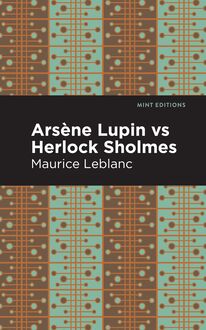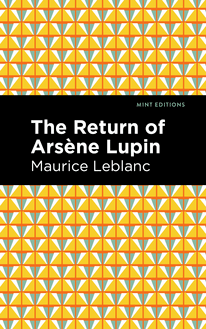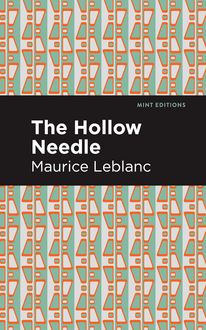-
 Univers
Univers
-
 Ebooks
Ebooks
-
 Livres audio
Livres audio
-
 Presse
Presse
-
 Podcasts
Podcasts
-
 BD
BD
-
 Documents
Documents
-
- Cours
- Révisions
- Ressources pédagogiques
- Sciences de l’éducation
- Manuels scolaires
- Langues
- Travaux de classe
- Annales de BEP
- Etudes supérieures
- Maternelle et primaire
- Fiches de lecture
- Orientation scolaire
- Méthodologie
- Corrigés de devoir
- Annales d’examens et concours
- Annales du bac
- Annales du brevet
- Rapports de stage
La lecture à portée de main
Vous pourrez modifier la taille du texte de cet ouvrage
Découvre YouScribe en t'inscrivant gratuitement
Je m'inscrisDécouvre YouScribe en t'inscrivant gratuitement
Je m'inscrisEn savoir plus
Vous pourrez modifier la taille du texte de cet ouvrage
En savoir plus

Description
The Return of Arsène Lupin (1917) is a novel by Maurice Leblanc. Blending crime fiction, fantasy, and mystery, Leblanc crafts original and entertaining tales of adventure starring one of the greatest literary characters of all time—Arsène Lupin, gentleman thief. Partly based on the life of French anarchist Marius Jacob, Lupin first appeared in print in 1905 as an answer to Sir Arthur Conan Doyle’s Sherlock Holmes.
Arsène Lupin is the world’s greatest thief, an unmatched force for good whose exploits threaten the wealth and standing of France’s most wicked men. In this installment of Leblanc’s beloved series, Lupin uses his remarkable wit and chameleon-like ability to move undetected through aristocratic society in order to steal, trick, and cheat his way through life. Despite his criminal nature, he operates under a strict moral code, only taking from those who have taken from the poor all their lives. The Return of Arsène Lupin opens on a world without Lupin—long thought dead, he even has a gravestone bearing his name. The First World War has come and gone, leaving a generation of men and women scarred irreparably. Two unlikely friends, wounded veterans Patrice and Ya-Bon, find comfort in their shared trauma. When Patrice is implicated in the murder of an acquaintance, they must race against time in order to find the true killer. In the final hour, a ghost from the past reappears to offer his help. The Return of Arsène Lupin is a story of romance, mystery, and crime that continues to astound over a century after it was published.
With a beautifully designed cover and professionally typeset manuscript, this edition of Maurice Leblanc’s The Return of Arsène Lupin is a classic of French literature reimagined for modern readers.
Sujets
Informations
| Publié par | Mint Editions |
| Date de parution | 24 mars 2021 |
| Nombre de lectures | 0 |
| EAN13 | 9781513295237 |
| Langue | English |
| Poids de l'ouvrage | 1 Mo |
Informations légales : prix de location à la page 0,0500€. Cette information est donnée uniquement à titre indicatif conformément à la législation en vigueur.
Extrait
The Return of Arsène Lupin
Maurice Leblanc
The Return of Arsène Lupin was first published in 1918.
This edition published by Mint Editions 2021.
ISBN 9781513292380 | E-ISBN 9781513295237
Published by Mint Editions®
minteditionbooks.com
Publishing Director: Jennifer Newens
Design & Production: Rachel Lopez Metzger
Project Manager: Micaela Clark
Typesetting: Westchester Publishing Services
C ONTENTS I . C ORALIE II . R IGHT H AND AND L EFT L EG III . T HE R USTY K EY IV . B EFORE THE F LAMES V . H USBAND AND W IFE VI . N INETEEN M INUTES P AST S EVEN VII . T WENTY- T HREE M INUTES P AST T WELVE VIII . E SSARÈS B EY’S W ORK IX . P ATRICE AND C ORALIE X . T HE R ED C ORD XI . O N THE B RINK XII . I N THE A BYSS XIII . T HE N AILS IN THE C OFFIN XIV . A S TRANGE C HARACTER XV . T HE B ELLE H ÉLÈNE XVI . T HE F OURTH A CT XVII . S IMÉON G IVES B ATTLE XVIII . S IMÉON’S L AST V ICTIM XIX . F IAT L UX!
I
C ORALIE
I t was close upon half-past six and the evening shadows were growing denser when two soldiers reached the little space, planted with trees, opposite the Mus é e Galli é ra, where the Rue de Chaillot and the Rue Pierre-Charron meet. One wore an infantryman’s sky-blue great-coat; the other, a Senegalese, those clothes of undyed wool, with baggy breeches and a belted jacket, in which the Zouaves and the native African troops have been dressed since the war. One of them had lost his right leg, the other his left arm.
They walked round the open space, in the center of which stands a fine group of Silenus figures, and stopped. The infantryman threw away his cigarette. The Senegalese picked it up, took a few quick puffs at it, put it out by squeezing it between his fore-finger and thumb and stuffed it into his pocket. All this without a word.
Almost at the same time two more soldiers came out of the Rue Galli é ra. It would have been impossible to say to what branch they belonged, for their military attire was composed of the most incongruous civilian garments. However, one of them sported a Zouave’s chechia , the other an artilleryman’s képi . The first walked on crutches, the other on two sticks. These two kept near the newspaper-kiosk which stands at the edge of the pavement.
Three others came singly by the Rue Pierre-Charron, the Rue Brignoles and the Rue de Chaillot: a one-armed rifleman, a limping sapper and a marine with a hip that looked as if it was twisted. Each of them made straight for a tree and leant against it.
Not a word was uttered among them. None of the seven crippled soldiers seemed to know his companions or to trouble about or even perceive their presence. They stood behind their trees or behind the kiosk or behind the group of Silenus figures without stirring. And the few wayfarers who, on that evening of the 3rd of April, 1915, crossed this unfrequented square, which received hardly any light from the shrouded street-lamps, did not slacken pace to observe the men’s motionless outlines.
A clock struck half-past six. At that moment the door of one of the houses overlooking the square opened. A man came out, closed the door behind him, crossed the Rue de Chaillot and walked round the open space in front of the museum. It was an officer in khaki. Under his red forage-cap, with its three lines of gold braid, his head was wrapped in a wide linen bandage, which hid his forehead and neck. He was tall and very slenderly built. His right leg ended in a wooden stump with a rubber foot to it. He leant on a stick.
Leaving the square, he stepped into the roadway of the Rue Pierre-Charron. Here he turned and gave a leisurely look to his surroundings on every side. This minute inspection brought him to one of the trees facing the museum. With the tip of his cane he gently tapped a protruding stomach. The stomach pulled itself in.
The officer moved off again. This time he went definitely down the Rue Pierre-Charron towards the center of Paris. He thus came to the Avenue des Champs- É lys é es, which he went up, taking the left pavement.
Two hundred yards further on was a large house, which had been transformed, as a flag proclaimed, into a hospital. The officer took up his position at some distance, so as not to be seen by those leaving, and waited.
It struck a quarter to seven and seven o’clock. A few more minutes passed. Five persons came out of the house, followed by two more. At last a lady appeared in the hall, a nurse wearing a wide blue cloak marked with the Red Cross.
“Here she comes,” said the officer.
She took the road by which he had arrived and turned down the Rue Pierre-Charron, keeping to the right-hand pavement and thus making for the space where the street meets the Rue de Chaillot. Her walk was light, her step easy and well-balanced. The wind, buffeting against her as she moved quickly on her way, swelled out the long blue veil floating around her shoulders. Notwithstanding the width of the cloak, the rhythmical swing of her body and the youthfulness of her figure were revealed. The officer kept behind her and walked along with an absent-minded air, twirling his stick, like a man taking an aimless stroll.
At this moment there was nobody in sight, in that part of the street, except him and her. But, just after she had crossed the Avenue Marceau and some time before he reached it, a motor standing in the avenue started driving in the same direction as the nurse, at a fixed distance from her.
It was a taxi-cab. And the officer noticed two things: first, that there were two men inside it and, next, that one of them leant out of the window almost the whole time, talking to the driver. He was able to catch a momentary glimpse of this man’s face, cut in half by a heavy mustache and surmounted by a gray felt hat.
Meanwhile, the nurse walked on without turning round. The officer had crossed the street and now hurried his pace, the more so as it struck him that the cab was also increasing its speed as the girl drew near the space in front of the museum.
From where he was the officer could take in almost the whole of the little square at a glance; and, however sharply he looked, he discerned nothing in the darkness that revealed the presence of the seven crippled men. No one, moreover, was passing on foot or driving. In the distance only, in the dusk of the wide crossing avenues, two tram-cars, with lowered blinds, disturbed the silence.
Nor did the girl, presuming that she was paying attention to the sights of the street, appear to see anything to alarm her. She gave not the least sign of hesitation. And the behavior of the motor-cab following her did not seem to strike her either, for she did not look round once.
The cab, however, was gaining ground. When it neared the square, it was ten or fifteen yards, at most, from the nurse; and, by the time that she, still noticing nothing, had reached the first trees, it came closer yet and, leaving the middle of the road, began to hug the pavement, while, on the side opposite the pavement, the left-hand side, the man who kept leaning out had opened the door and was now standing on the step.
The officer crossed the street once more, briskly, without fear of being seen, so heedless did the two men now appear of anything but their immediate business. He raised a whistle to his lips. There was no doubt that the expected event was about to take place.
The cab, in fact, pulled up suddenly. The two men leapt from the doors on either side and rushed to the pavement of the square, a few yards from the kiosk. At the same moment there was a cry of terror from the girl and a shrill whistle from the officer. And, also at the same time, the two men caught up and seized their victim and dragged her towards the cab, while the seven wounded soldiers, seeming to spring from the very trunks of the trees that hid them, fell upon the two aggressors.
The battle did not last long. Or rather there was no battle. At the outset the driver of the taxi, perceiving that the attack was being countered, made off and drove away as fast as he could. As for the two men, realizing that their enterprise had failed and finding themselves faced with a threatening array of uplifted sticks and crutches, not to mention the barrel of a revolver which the officer pointed at them, they let go the girl, tacked from side to side, to prevent the officer from taking aim, and disappeared in the darkness of the Rue Brignoles.
“Run for all you’re worth, Ya-Bon,” said the officer to the one-armed Senegalese, “and bring me back one of them by the scruff of the neck!”
He supported the girl with his arm. She was trembling all over and seemed ready to faint.
“Don’t be frightened, Little Mother Coralie,” he said, very anxiously. “It’s I, Captain Belval, Patrice Belval.”
“Ah, it’s you, captain!” she stammered.
“Yes; all your friends have gathered round to defend you, all your old patients from the hospital, whom I found in the convalescent home.”
“Thank you. Thank you.” And she added, in a quivering voice, “The others? Those two men?”
“Run away. Ya-Bon’s gone after them.”
“But what did they want with me? And what miracle brought you all here?”
“We’ll talk about that later, Little Mother Coralie. Let’s speak of you first. Where am I to take you? Don’t you think you’d better come in here with me, until you’ve recovered and taken a little rest?”
Assisted by one of the soldiers, he helped her gently to the house which he himself had left three-quarters of an hour before. The girl let him do as he pleased. They all entered an apartment on the ground-floor and went into the drawing-room, where a bright fire of logs was burning. He switched on the electric light:
“Sit down,” he said.
She dropped into a chair; and the captain at once gave his orders:
“You, Poulard, go and fetch a glass in the dining-room. And you, Ribrac, draw a jug of cold water in the kitchen… Chatelain, you’ll find a decanter of rum in the pantry… Or, stay, she doesn’t like rum… Then…”
“
-
 Univers
Univers
-
 Ebooks
Ebooks
-
 Livres audio
Livres audio
-
 Presse
Presse
-
 Podcasts
Podcasts
-
 BD
BD
-
 Documents
Documents
-
Jeunesse
-
Littérature
-
Ressources professionnelles
-
Santé et bien-être
-
Savoirs
-
Education
-
Loisirs et hobbies
-
Art, musique et cinéma
-
Actualité et débat de société
-
Jeunesse
-
Littérature
-
Ressources professionnelles
-
Santé et bien-être
-
Savoirs
-
Education
-
Loisirs et hobbies
-
Art, musique et cinéma
-
Actualité et débat de société
-
Actualités
-
Lifestyle
-
Presse jeunesse
-
Presse professionnelle
-
Pratique
-
Presse sportive
-
Presse internationale
-
Culture & Médias
-
Action et Aventures
-
Science-fiction et Fantasy
-
Société
-
Jeunesse
-
Littérature
-
Ressources professionnelles
-
Santé et bien-être
-
Savoirs
-
Education
-
Loisirs et hobbies
-
Art, musique et cinéma
-
Actualité et débat de société
- Cours
- Révisions
- Ressources pédagogiques
- Sciences de l’éducation
- Manuels scolaires
- Langues
- Travaux de classe
- Annales de BEP
- Etudes supérieures
- Maternelle et primaire
- Fiches de lecture
- Orientation scolaire
- Méthodologie
- Corrigés de devoir
- Annales d’examens et concours
- Annales du bac
- Annales du brevet
- Rapports de stage




















